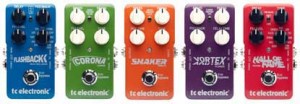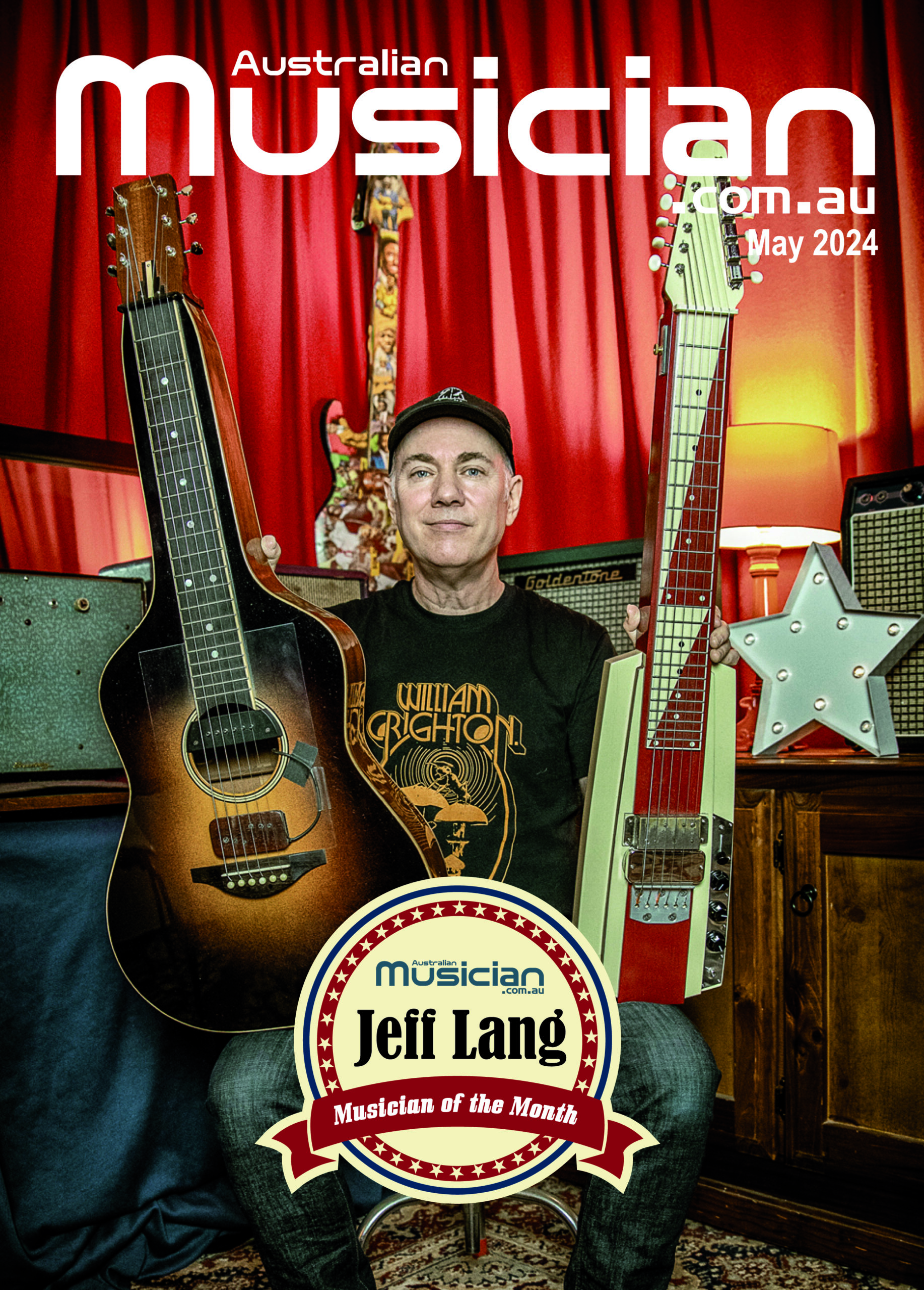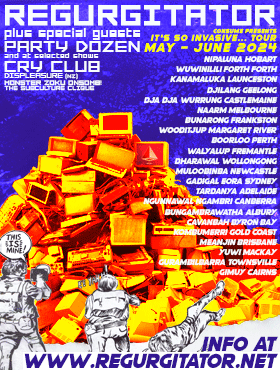 One person, one pick, one (piece of) gear! Doesn’t have the same ring about it as the bourbon, scotch and beer line, made famous by John Lee Hooker and George Thorogood but it totally tells the tale of Guthrie Govan’s upcoming tour to Australia. He is literally coming on his own, bringing one guitar pick and one guitar… but read more about that later. UK bred guitarist Govan will be one of the main attractions at this year’s Adelaide Guitar Festival (July 17-20). His rise to fame initially came through his work with international musician magazines in which he was known for his impeccable transcriptions. His YouTube tutorials have become staples for those with ambitions of shredding their way through life. These days Guthrie occupies most of time playing with progressive acts such as Asia, Steve Wilson and his own trio The Aristocrats. He released a solo album Erotic Cakes back in 2006 and is working on another. He is one of the most versatile electric guitar players going around and as AM’s Greg Phillips found out, is a wise man who says sage-like things about guitar playing.
One person, one pick, one (piece of) gear! Doesn’t have the same ring about it as the bourbon, scotch and beer line, made famous by John Lee Hooker and George Thorogood but it totally tells the tale of Guthrie Govan’s upcoming tour to Australia. He is literally coming on his own, bringing one guitar pick and one guitar… but read more about that later. UK bred guitarist Govan will be one of the main attractions at this year’s Adelaide Guitar Festival (July 17-20). His rise to fame initially came through his work with international musician magazines in which he was known for his impeccable transcriptions. His YouTube tutorials have become staples for those with ambitions of shredding their way through life. These days Guthrie occupies most of time playing with progressive acts such as Asia, Steve Wilson and his own trio The Aristocrats. He released a solo album Erotic Cakes back in 2006 and is working on another. He is one of the most versatile electric guitar players going around and as AM’s Greg Phillips found out, is a wise man who says sage-like things about guitar playing.
You’re a self taught musician and have learned so many different styles so well. It seems that guitar was in your genes. Tell me about your parents musical influence on you.
My dad played a little bit so I learned my first five chords, maybe six from him when i was very young. I got a taste for music from that and I asked my dad what else have you got? I’m bitten by the musical bug now and I need more knowledge. He said, well that’s really all I know, you’re on your own now! So I rifled through their vinyl collection. The biggest contribution from my parents to the way I turned out, was not so much the five chords I learned from my dad. It was more that they had a good record collection and I sensed growing up that music was an important thing, an art form and not just something you should hear in the background of your life. I’m grateful that I worked that out so early at a young impressionable age.
What were some of the key albums in their collection?
A lot of Hendrix and Beatles and that kind of thing. So I grew up listening to the same music my dad was listening to. It was a great time for electric guitar. That whole 60s, 70s thing, that’s when people were writing the rule book about what was possible on this relatively young instrument. The really fun thing was that there were some unexpected records tucked away in there as well. I remember finding an album called Virtouso by Joe Pass … solo finger style, jazz chord melody stuff which had no intersection with the Stones, Clapton and all of that stuff. I found West Side Story in there and again, there’s all sorts of harmonic challenges and surprises in there that you wouldn’t get from listening to the standard blues rock fare. It’s always made sense to me to listen to lots of different kinds of music.
Were you able to repay your dad and teach him a 6th or 7th chord?
Um, I wish I had in retrospect. His ambitions as a musician had pretty much faded by the time I turned up. He was happy with the five chords he knew and to be honest, most of the music he liked, he could play using those five chords. They are the best five chords! Everything else is just a luxury. I have an enquiring mind and wanted to know all of the other chords but it’s only a small percentage of time you actually need that stuff.
A lot of people ask you a lot of questions about playing guitar. In one interview I read, you were saying something really basic but it made so much sense, and that was that you have to know what you want FROM your guitar playing before you know WHAT to do. What did you always want from your guitar playing?
I never really felt a need to question it in the same way I never had to ask myself, why do I speak English? That’s really the closest analogy. Music feels like a mother tongue. It feels like a language I have always spoken. If you have that relationship with music, to some extent you are off the hook and you don’t have to analyse your motivations or goals in the same way as someone who buys their first guitar at the age of 14 with all these new hormones going through their veins and maybe a Dream Theater album inspiring them to play their first note. I have just played for such a long time, I guess it has always just felt natural to me. If I had to sum it up in a trite soundbyte, it would be, I play music because I can’t help it!
When you’re learning guitar and you’re progressing along the way and getting better and better over the years, the improvement is not so noticeable because its gradual. But to others who hear you play occasionally they do notice. I’m wondering if there was a moment into your development as a player, where you realised that you’d come a long way? Do you recall any such pivotal moments?
Lots of little pivotal moments. Sometimes the light bulb will happen when you’ve been trying to work something out for a long time and you finally solve the puzzle and realise how this guy on the record is actually making those sounds. I remember working out this thing called Harp Harmonics. I had a very faded, blurry tape of Chet Atkins playing When you Wish Upon A Star on guitar and there were these freaky noises coming out and I was thinking that my guitar didn’t contain those notes. I remember solving the puzzle one day, realising what technique he must have been using. So I have had lots of little moments like that. Sometimes the lightbulb moment happens when you hear a player for the first time and it’s not necessarily that you have figured out how to do something that they are doing. It is more their mindset and listening to the kind of things they are doing. More of a raw inspiration rather than a technical thing.
One of my fave live albums from 70s is Ten Years After Recorded Live. Alvin Lee used to play these little incidental pieces like Scat Thing, Classical Thing and Silly Thing. When I heard your work with The Aristocrats it reminded me of those little tunes. Were you an Alvin Lee fan?
Not so much. I mean I have huge respect for what he did. He wasn’t there during my musical growing up period. He wasn’t there when I needed him the most. At the time he was the fastest gun in the west wasn’t he, that was the selling point. That’s how they would advertise Alvin Lee … check out his ferocious technique. He made other rock guys seem like they were playing at the wrong speed. I listen to it now and can understand with a bit more perspective what he contributed to the language of rock guitar. I guess there was a playfulness in there. There’s a guy who had a lot of technique but he was having fun with it rather than just trying to terrify people with it. In that sense I’m glad you said there’s some kind of thematic link with what the Aristocrats do because that’s what we are going for, we enjoy being able to play like that and we try to share the fun that we have with people.
 You’re coming to Australia for the Adelaide Guitar Festival and for some masterclasses. Have you actually been here before?
You’re coming to Australia for the Adelaide Guitar Festival and for some masterclasses. Have you actually been here before?
Once before, I think I was there for about four days. I think we did three gigs in four days. It’s a long way from home. I remember being completely delirious with jet-lag and being sleep deprived and confused. I tried to soak up as much of Australia as I could to the extent of waking up at 5 in the morning so I could go to the Brisbane Koala sanctuary on the same day we had a gig.
Were you aware of any Australian music growing up?
Let me think. Do we count people like Frank Gambale?
Of course!
I’ve always been very aware of him. I guess I am aware of Men at Work because Chad Wackerman who plays drums with Steven Wilson was sometimes one of the Men at Work! One of his dark secrets.
I believe you’re a fan of Tommy Emmanuel?
Oh very much. I was fortunate enough to jam with him once and I no longer call myself a guitar player! That guy is ridiculous. He’s such an entertainer as well. Not just technical showboating, there’s a guy with an acoustic guitar where you can take the whole family and generations of the family will all find something good in what he does, whether they play or not. He’s such a great communicator.
With a gig like the Adelaide Guitar Festival, do you approach the gig differently to what you would a normal gig?
A lot of what I do is not a normal gig. I often get invited to far flung corners of the world and I know that when I get there, there’ll be a gig of some kind. Often it is with local musicians that I have never met before and I’ll have one day of jet-lagged rehearsal time and we just have to hope that we’ll click. So we have one of those situations in Adelaide. I believe they have hooked me up with the local muso mafia, whoever the hot players are. I think the festival organisers have rounded up this crack team of musicians who’ve assured me they would have learned my music. We’ll see how quickly we can get things to fall into place. I’m looking forward to it. Generally these things work pretty well. There’s a unique energy on stage with this uncertainty coupled with everyone being capable. Everyone is listening to everyone else extra hard. In a live context, a lot of cool stuff comes out of that I think.
You probably get approached by a lot of guitar companies. What are the most important factors that go into making a great guitar for you?
It has to be easy to play. Otherwise some of my circus trick stuff won’t work, so it needs to feel comfortable and natural. Other than that I think the main thing is the wood. Some people forget this when they think of an electric guitar. They think there are some strings and some electronics to make the strings loud but really every electric guitar has a unique sound, derived from the trees someone used to build the instrument. There are different ways of doing the electronics. If you have very high output pickups, it’s great for the heavy metal stuff, getting the most violent powerful sound you can coax out of the instrument. But if you wire a guitar that way, sometimes you don’t hear the nuances of the wood. I’m a big fan of treating the electric guitar like an acoustic instrument. The way it vibrates when you just pick a guitar up and listen to it before you plug it into an amp, you can learn a lot about the character of the guitar just by hearing that lump of wood vibrate. I’ve spent a lot of time over the years exploring different lumps of different trees and figuring out what works for me.
How many guitars will you bring to Australia?
Just one.
I suppose you then have to really look after it?
Yeah, well I am pretty good at looking after guitars. The real worry is the airline. Will the airline look after your guitar?
Have you had a think about what will be in your pedal board for Australia?
I have a standard pedal board which I designed so that it fits into one half of my suitcase. Toothbrushes and sox in one half and the other half, this pedalboard with the essentials. if it is something like a chorus pedal, I’ll go for the smallest option. It’s a fairly humble pedalboard; wah wah, volume pedal, analogue delay, chorus, a couple of other little things and a tuner. It seems to get me through 95% of the musical situations in which I find myself. I’m a big fan of trying to get as many different sounds as you can out of just a guitar and amp. It’s partially something I worked out when I was younger and we didn’t really have much money for pedals or fancy equipment. i had one guitar and one amp and I was trying to get all the different sounds I was hearing on guitar player records. There is so much you can do with just your fingers. I know it’s a cliche and a lot of people say it just to infuriate you but there is truth in that.
 You’re doing a bit of work with TC Electronic. Tell me about that.
You’re doing a bit of work with TC Electronic. Tell me about that.
Yes, they’re doing a very clever thing. They sell you this shell of a pedal, whether that’s a neutral delay pedal or chorus pedal. Then you decide what kind of pedal you want it to be. You can dictate the flavour of chorus or delay, you have all of these different options. When you’re at home, you can fine tune that, the knobs do exactly what you want them to do. You can specify the lowest point and the highest point of each parameter and you can tweak the EQ, and basically customise, personalise the pedal and then just save it. it’s nice to have those options if you’re a tweaker! If you like fine tuning tones, there’s all this potential there to do so. Or if you don’t like fine tuning tones, they have this whole library of pre sets that other players have done and I guess I’m one of those. They call them TonePrints and they set the parameters that tell each pedal to behave in a certain way and you can beam these things into your pedal from your iPhone. You hold the phone next to the pickup on the guitar and press Paul Gilbert setting number 3 or Bumblefoot number 5 and magically the pedal hears it and becomes that pedal. What a time to be alive!
You bend your strings around a bit. I wonder how often you like to change your strings and what do you use?
I use Rotosound strings, 10-46 gauge and how often do I change them? It depends on a couple of things. If I am recording, I’ll generally want a clean set of strings before I start recording and after one day, they’re done and I don’t trust them anymore. In terms of gigging, generally I can trust a set of strings for 3 or 4 gigs before I worry about anything breaking. It’s very, very rare that I break strings during a gig. We toured with The Aristocrats for 3 months going throughout Europe earlier this year and I broke one string on the whole tour. There’s a way of doing it so that you can bend the strings violently and hit them hard and they won’t necessarily break. If you put them on the correct way.
A lot of people would ask you about your guitar amps and pedals but what about the accessories? How long did it take you to arrive at the right pick for you?
Most of my life! I finally found this company who mad the perfect pick for me maybe four years ago. I was at a trade show, NAMM and I met Dweezil Zappa and that was a lot of fun. We were being guitar geeks and comparing notes and he said check this out, I’ve been trying this pick. This company has sourced some kind of disgusting organic material. I think a mixture of dairy protein and formaldehyde but they treat it in a certain special way. It sounds and feels to all intents and purposes exactly like turtle shell, so you don’t have to kill anything. It’s kind of a responsibility to have a pick like that because they are more expensive than the standard plastic pick. If you take care of them and smooth the edges with a file every now and then and try not to get them wet, don’t leave them in your jeans pocket before you go to the laundrette, one of those picks will last you months. The only problem is when you are doing a gig or clinic in a country where English is not the main language. Mexico for instance. After the gig, everyone in the front row is doing this hand signal to please give me your pick. I have one pick for the whole tour, you can’t have it because I need it for my job. In parts of the world where the English language is not so good, I’m sure I have upset lots of people. I’m sure on the internet there are people saying I am like Mr Burns from The SImpsons and stingy and unpleasant, you know, all I wanted was this plastic pick and he wouldn’t give it to me! I hated him. What can you do?
What about cables, can a good cable improve your sound?
Yes very much so. All of that stuff makes a difference. I’d say if someone had money to spend on one good cable, the place to put it is between your guitar and the first pedal. I think that’s the most critical cable of them all. It’s one of those things where you can spend ten times as much money for ten percent more improvement. It is definitely one of the finer details but I do try to care about that stuff because it is my job and I may as well try and do one thing in my life properly.
We don’t see you play acoustic guitar so much, do you enjoy playing acoustically?
I like it but I don’t pretend to be a proper acoustic guitar player. For me it’s a different instrument. In particular a nylon string guitar. I can’t even play one note that sounds as good as what I want that note to sound. Classical guys spend years focussing on getting that authentic nylon string tone. I can pretend to play acoustic guitar and it’s it’s fun and I record sessions for people sometimes but I am not under any illusions about being an acoustic player. As we discussed earlier, I have met Tommy Emmanuel and jammed with him on stage and I know the difference.
Have you ever built a guitar?
No never really gone there. I am quite good at tweaking guitars and setting them up which is something I have learned more about from doing sample replays, which is another aspect of what I do for a living. Guys in the dance community might have a demo for their next single and they have used 4 bars of a James Brown loop or something like that and discovered they can’t get permission to use the loop. I do a lot of guitar and bass work for a company who basically copy those loops, sometimes identical, sometimes we have to swap some notes around. Whoever it is making this house track will have a useable version of that loop without the copyright complications. Through doing a lot of that work, you find out how to make your guitar sound like the guitar on someone else’s record. Sometimes it’s something silly like varying the pickup height or using an atypical set of strings. That’s taught me a lot about how to tweak gear. Building guitars? That’s for other people.
http://www.adelaidefestivalcentre.com.au/guitar-festival/
http://www.guthriegovan.co.uk/


